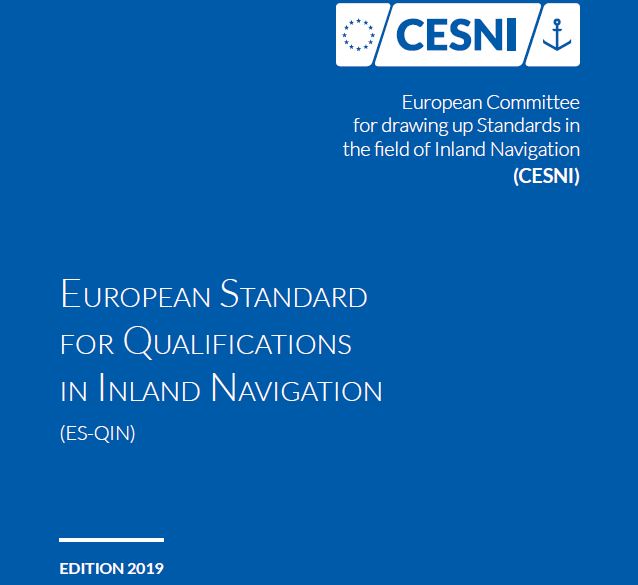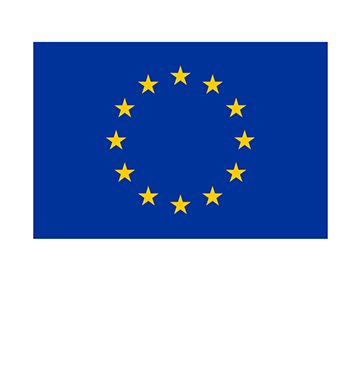Publication of ES-QIN 2019 – European Standard for Qualifications in Inland Navigation
01/04/2020
Strasbourg, 01 April 2020 – The consolidated version of the European Standard for Qualifications in Inland Navigation (ES-QIN), edition 2019, is now available on CESNI’s website.

ES-QIN edition 2019 includes:
1. A first set of standards, the so-called “Prague Standards”, adopted in 2018 (see Press release) and divided into 4 main parts, as follows:
- Part I: Standards for competences
- Part II: Standards for practical examinations
- Part III: Standards for the approval of simulators
- Part IV: Standards for medical fitness
2. A second set of five standards on models, adopted in 2019, included in:
- Part V: Standards for models of crew-related documents
ES-QIN is a cornerstone of a modern, highly qualified inland navigation sector.
The main objectives of the standards adopted by CESNI in the field of professional qualifications are to:
- foster labour mobility by setting standards that can be used by the European Union (EU), the Central commission for the navigation of the Rhine (CCNR) and other legislators,
- make the profession ever more attractive,
- ensure safe navigation by means of ambitious requirements in terms of knowledge, skills and fitness, and
- enable companies and crews to adapt to technical and logistic innovation.
A reference framework for the entire career of navigation personnel in inland navigation
This reference framework accompanies navigating personnel throughout their entire career:
- Training: ES-QIN defines all the competences that need to be acquired by the concerned crew member, defining a common basis and additional competences according to the activity (navigation by radar, on inland waterways with a maritime character, passenger navigation, LNG navigation, etc.).
- Evaluation: ES-QIN specifies which competencies must be assessed to validate prior learning; it also defines the requirements of the simulators used in the exams
- Certificates of qualification: ES-QIN defines models for the documents serving as a proof of qualification and fitness (certificates), but also modalities to record the experience gained in order to advance in the careers of the navigation personnel.
- Medical fitness: ES-QIN draws up a detailed list of medical criteria for use by the medical profession. This list is designed to ensure the safety of the craft, crew, passengers and cargo under the specific circumstances of inland navigation.
And that’s not all: international experts of CESNI continue their work to build a robust framework for all-career stages:
- Basic safety training for entrants to the professions (deckhands).
- Entrepreneurship: define entrepreneurial skills to become an entrepreneur in inland waterways transport.
- Digital environment: accompany the personnel who will evolve in an increasingly digital environment (and more generally deal with equipment allowed for automated navigation).
- Energy transition: accompany the personnel through the energy transition – for example, through the adoption of eco-friendly driving practices or through training sessions to use new modes of propulsion on board.
The list of tasks is available in CESNI’s work programme 2019-2021.
A normative frame of reference for many actors involved in inland navigation
Until the full implementation in January 2022 of the new European framework for modern qualifications, a great deal of work will have to be carried out by a number of actors on the basis of ES-QIN:
- International and national regulatory bodies are currently carrying out substantive legal work to refer to ES-QIN in their frameworks.
- National authorities will prepare the rules for issuing new certificates, including the first electronic certificates.
- Training institutes will have to adjust their curricula and training programmes.
- Exam commissions will have to change their procedures and prepare for mandatory practical examinations.
CESNI standards are not binding per se. The CCNR, the EU and other international organisations or third countries may wish to apply the standards by integrating them into their respective legal frameworks. In the framework of ES-QIN, standards aim to define crew-related requirements in order to ensure the recognition of the qualification certificates issued.
To find out more about professional qualifications in CESNI, please visit the dedicated page on CESNI’s website: https://www.cesni.eu/en/professional-qualifications/

